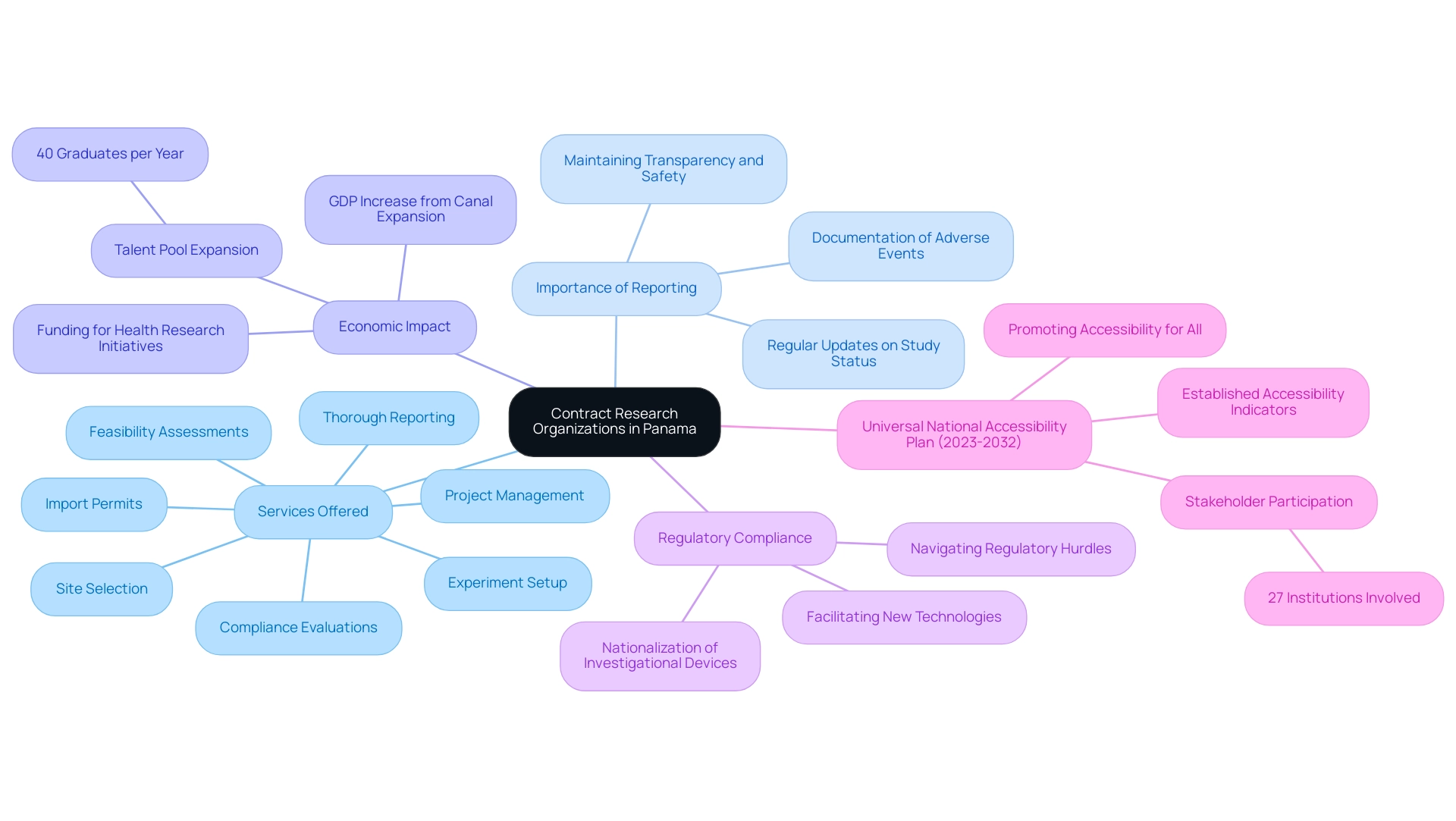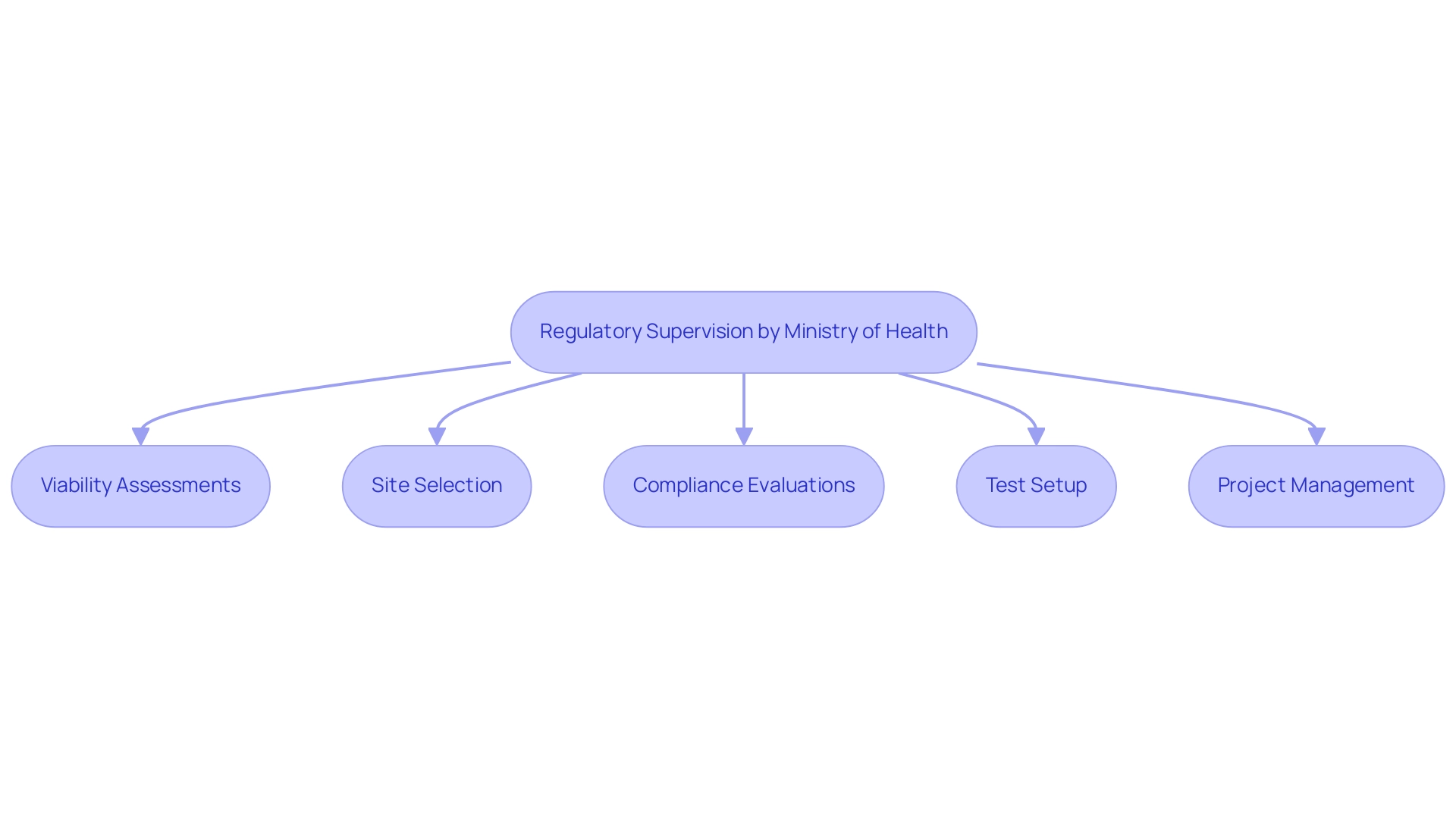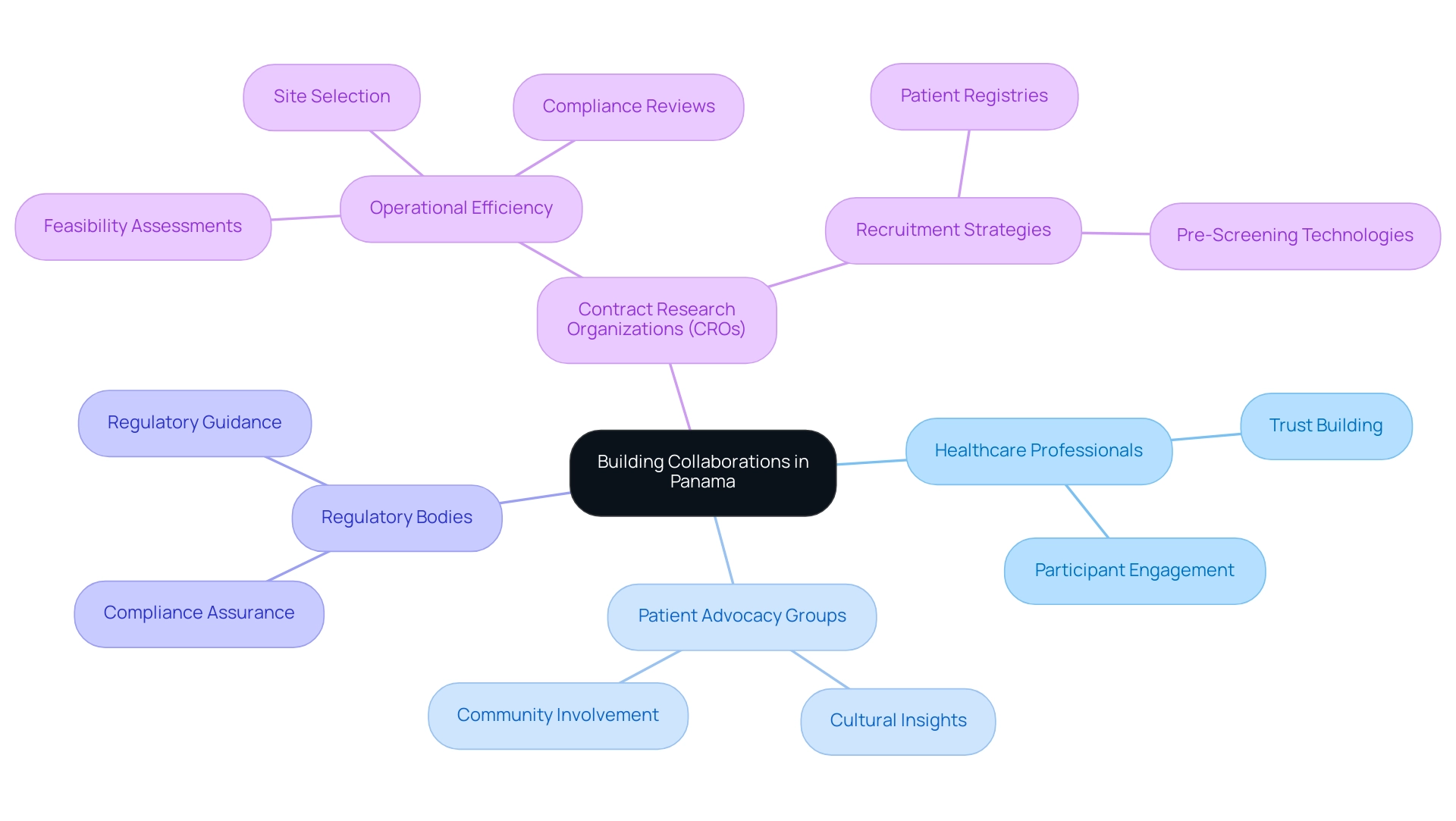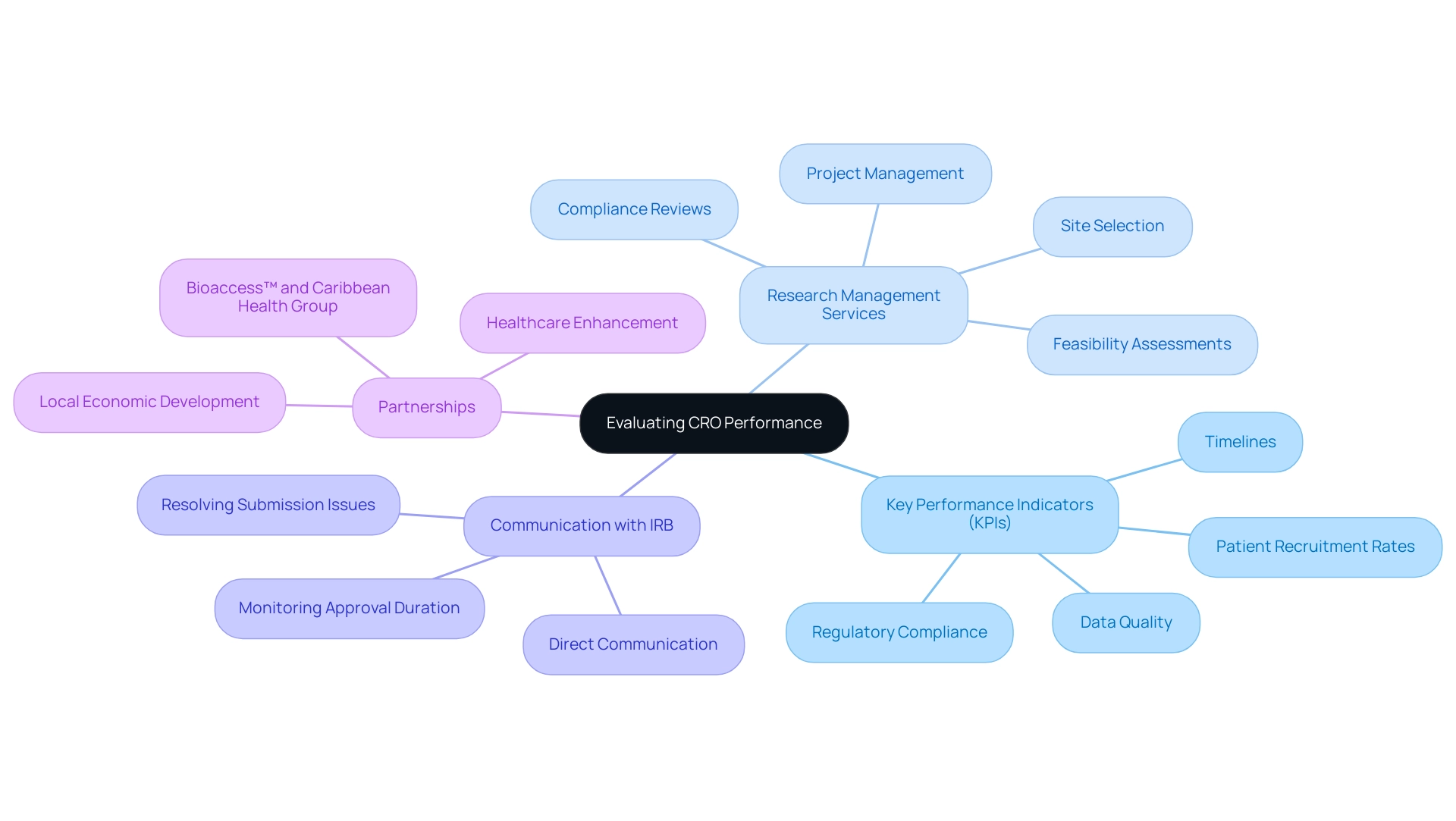Overview
Panama Contract Research Organizations (CROs) are specialized entities that facilitate medical research by providing comprehensive services such as feasibility assessments, compliance evaluations, and project management, ensuring adherence to international standards while addressing local healthcare needs. The article emphasizes their critical role in advancing medical innovation in Panama, particularly through collaborations with local stakeholders and the strategic advantages of the country's regulatory framework and geographical location, which enhance research efficiency and participant recruitment.
Introduction
In the dynamic field of clinical research, Contract Research Organizations (CROs) in Panama are emerging as pivotal players, streamlining the complex processes involved in clinical trials. These organizations not only facilitate the planning and execution of studies but also navigate the intricate regulatory landscape that governs medical research. As Panama positions itself as a burgeoning hub for clinical trials, understanding the multifaceted role of CROs becomes essential for stakeholders aiming to leverage the country's strategic advantages.
From fostering local collaborations to ensuring compliance with stringent regulations, the contributions of CROs are vital in advancing healthcare innovations and enhancing patient access to new therapies. This article delves into the comprehensive services offered by CROs in Panama, the opportunities and challenges they face, and the metrics that define their success in the clinical research ecosystem.
Defining Contract Research Organizations in Panama
The Panama Contract Research Organization acts as a vital collaborator in the research landscape, providing an extensive array of services that aid in the planning, execution, and management of studies. These specialized entities play a critical role in advancing the development of innovative medical treatments and therapies, adept in navigating the challenges faced by medical device startups, such as regulatory hurdles, competition, and recruitment issues. Equipped with expertise in:
- Feasibility assessments
- Site selection
- Compliance evaluations
- Experiment setup
- Import permits
- Project management
- Thorough reporting
the Panama Contract Research Organization ensures that medical investigations in Panama meet stringent international standards while addressing local healthcare needs.
Reporting is a crucial aspect of their services, encompassing regular updates on study status and the documentation of serious and non-serious adverse events to maintain transparency and safety throughout the trial process. As Cristiane Quental highlights, 'The Panama Contract Research Organization plays a crucial role in connecting the divide between medical studies and the healthcare system, ensuring that innovations reach the patients who require them the most.' Their contributions are increasingly significant, particularly as Panama anticipates a robust GDP increase linked to the Canal expansion, which may further enhance funding for health research initiatives.
Additionally, the implementation of Panama's first Universal National Accessibility Plan (2023-2032) aims to promote accessibility for all societal groups, developed with the participation of multiple stakeholders. This initiative could positively impact CRO operations and the overall research environment. Additionally, with an average of 40 graduates each year from master's programs in basic sciences, health sciences, and public health, the talent pool supporting these organizations keeps expanding, reinforcing the foundation for efficient health research execution.
Importantly, the nationalization of investigational devices is a key component of the regulatory process that the Panama Contract Research Organization navigates, ensuring compliance and facilitating the introduction of new technologies to the market. As Panama navigates updates in health studies for 2024, the Panama Contract Research Organization's role remains essential in ensuring the integrity and success of medical initiatives, exemplified by collaborative efforts such as those seen in the Universal National Accessibility Plan.

Why Choose Panama for Clinical Research: Opportunities and Advantages
The Panama Contract Research Organization has established the country as a compelling destination for medical research, driven by several distinct advantages. Our extensive research management services include:
- Feasibility analysis
- Site selection
- Compliance assessments
- Setup
- Import permits
- Project oversight
- Thorough reporting, encompassing review and feedback on research documents and reporting of serious and non-serious adverse events.
The country has a beneficial regulatory system that encompasses simplified procedures, leading to considerably quicker approval times for research studies.
This efficiency not only speeds up the research timeline but also improves the overall practicality of conducting investigations. For instance, Stage IV patients had a mean cost of 1302 US$ for a care rate of 32.5%, illustrating the cost-effectiveness of conducting trials in Panama. Additionally, Panama's strategic geographic location provides researchers with access to a diverse patient population, crucial for effective recruitment of study participants.
The nation is outfitted with contemporary healthcare amenities and has an expanding group of skilled healthcare experts, further reinforcing its status as a medical development center. As Ayuso C. noted, 'Ensayos clínicos en enfermedades raras financiados por los participantes,' highlighting the potential for innovative studies in rare diseases. Moreover, carrying out medical studies in Panama is significantly affordable in comparison to other areas, rendering it an economically appealing choice for pharmaceutical firms and funding sponsors as well.
This combination of regulatory advantages, logistical benefits, and economic viability positions the Panama Contract Research Organization as a prime location for advancing medical initiatives. For Directors of Clinical Research, these services not only streamline the process but also ensure compliance and effective monitoring throughout the study phases. By drawing comparisons with the Colombian government's efforts to attract research studies, which seek to enhance the research environment and may result in over 100 new studies each year, Panama is likewise positioned to improve its reputation and results in the research landscape.

Navigating the Regulatory Landscape for CROs in Panama
The regulatory environment for the Panama Contract Research Organization is mainly supervised by the Ministry of Health, which plays a crucial role in the approval and monitoring of clinical studies. Our extensive service abilities encompass:
- Viability assessments
- Site selection
- Compliance evaluations
- Test setup—which involves obtaining ethics committee approvals and import permits
- Project management
We ensure all operations align with the increasingly stringent regulatory framework.
According to recent statistics, the Department of Health Services (DHS) projects that total encounters will average between 3,900 to 6,700 per day, underscoring the demand for efficient regulatory processes. CROss must comply with rigorous guidelines, including ensuring informed consent from all participants and adhering to meticulous documentation protocols. Katherine Ruiz, an expert in Regulatory Affairs for medical devices and in vitro diagnostics in Colombia, emphasizes the importance of maintaining comprehensive records and promptly reporting any adverse events that arise during trials.
Reporting involves overseeing project status and recording both serious and non-serious adverse events. Eduardo Miranda Martinez, a telemedicine patient, highlights this necessity, stating, 'For example, if a patient cannot keep his appointment, there is no way to contact the doctor to reschedule.' Recent case studies further illustrate the challenges and successes in regulatory compliance, emphasizing the necessity for the Panama Contract Research Organization to navigate this framework effectively to operate successfully and maintain the integrity and credibility of their research activities, as outlined by insights from Julio G. Martinez-Clark.

Building Collaborations: Engaging Local Stakeholders in Panama
Establishing robust collaborations with local stakeholders is essential for the effective operation of Panama Contract Research Organizations (CROs). Involving healthcare professionals, patient advocacy groups, and regulatory bodies is essential to promoting trust and transparency within the clinical research ecosystem. Engaging these stakeholders during the planning and execution stages of studies can significantly improve participant recruitment and retention rates, as demonstrated by GlobalCare Clinical Trials' collaboration with bioaccess™, which achieved over a 50% reduction in recruitment time and a retention rate exceeding 95%.
Furthermore, these partnerships provide invaluable insights into cultural nuances that may affect outcomes. As highlighted in the review titled 'Advancing Community Stakeholder Engagement in Biomedical HIV Prevention Trials,' effective communication and relationship-building are crucial components for the Panama Contract Research Organization seeking to thrive in Panama's clinical research landscape. Such collaborations not only enhance efficacy but also align with the broader National Agenda, promoting economic growth and advancements in healthcare.
As Luz Isabel Romero noted, 'the analysis reveals the need for a new priority-setting exercise that validates the National Agenda, promotes its implementation by the National Secretariat for Science, Technology and Innovation in conjunction with the Ministry of Health, and empowers multiple stakeholders.' Moreover, integrating particular service capabilities such as feasibility assessments, site selection, and compliance reviews improves the operational efficiency of CROs. Utilizing patient registries and pre-screening technologies can further broaden access to research opportunities and accelerate recruitment timelines, thereby improving the overall success rates of studies conducted by the Panama Contract Research Organization.
Thorough project management and reporting procedures are also essential, guaranteeing that research is conducted efficiently and that all regulatory requirements are fulfilled.

Evaluating CRO Performance: Metrics for Success in Clinical Trials
Assessing the effectiveness of the Panama Contract Research Organization is essential for guaranteeing the quality and success of research studies. Comprehensive research management services—such as feasibility assessments, site selection, compliance reviews, setup, import permits, and project management—are essential components in this evaluation. Key performance indicators (KPIs), including metrics like patient recruitment rates, adherence to timelines, data quality, and compliance with regulatory requirements, are vital for assessing CRO effectiveness.
For example, as noted with Citruslabs’ patient recruitment dashboard, connecting researchers to over 3 million registered patients highlights the growing trends in patient recruitment rates for CROss. Frequent evaluations of these metrics enable stakeholders to pinpoint areas requiring enhancement and ensure that the Panama Contract Research Organization is achieving its study objectives.
Establishing direct communication with the Institutional Review Board (IRB) is also crucial in addressing potential delays in the approval process, which is a significant milestone in studies. A case study on the IRB approval process highlights the necessity for study sites to monitor the duration from submitting protocols to IRB approval. Delays often indicate missing information in submissions, underscoring the importance of timely communication to resolve issues swiftly, promote smoother trial initiation, and enhance site reputation.
Moreover, partnerships, such as that between bioaccess™ and Caribbean Health Group, aim to position Barranquilla as a premier destination for research trials in Latin America, a goal supported by Colombia's Minister of Health. This partnership not only enhances the environment for medical studies but also aids local economic development and healthcare enhancement. Kenneth A. Getz emphasizes, 'Finally, Standardized KPIs are Front and Center,' which underscores the importance of KPIs in evaluating the performance of a Panama Contract Research Organization.
Collecting feedback from participants and investigators provides valuable insights into the operational effectiveness of the Panama Contract Research Organization. Additionally, utilizing tools such as Google Analytics can offer data on CRO performance, allowing stakeholders to make informed decisions. By implementing a robust evaluation framework that incorporates compliance reviews, specific reporting elements like study status, inventory, and serious and non-serious adverse events, stakeholders can significantly enhance the overall success of clinical research efforts in Colombia.

Conclusion
Contract Research Organizations (CROs) in Panama are integral to the success of clinical research, providing a wide array of services that enhance the planning, execution, and management of clinical trials. Their expertise not only addresses the complexities of regulatory compliance but also fosters local collaborations that are essential for effective participant recruitment. As Panama continues to strengthen its position as a clinical research hub, the role of CROs becomes increasingly critical in navigating the evolving landscape of medical research.
The advantages of conducting clinical trials in Panama are manifold, including a favorable regulatory framework, cost-effectiveness, and a diverse patient population. These factors collectively contribute to accelerated research timelines and improved feasibility for pharmaceutical companies and research sponsors. The ongoing development of healthcare infrastructure and the implementation of national initiatives, such as the Universal National Accessibility Plan, further enhance the operational environment for CROs, ensuring that they can meet both local and international standards.
As the clinical research ecosystem in Panama grows, the importance of evaluating CRO performance through key metrics cannot be overstated. By focusing on patient recruitment rates, adherence to timelines, and data quality, stakeholders can ensure that CROs effectively contribute to the advancement of healthcare innovations. Ultimately, the collaborative efforts of CROs, local stakeholders, and regulatory bodies will play a pivotal role in delivering new therapies to patients, thereby reinforcing Panama's status as a leading destination for clinical research in the region.
Frequently Asked Questions
What services does the Panama Contract Research Organization provide?
The Panama Contract Research Organization offers services including feasibility assessments, site selection, compliance evaluations, experiment setup, import permits, project management, and thorough reporting.
How does the Panama Contract Research Organization contribute to medical research?
It plays a vital role in advancing the development of medical treatments and therapies by helping medical device startups navigate regulatory hurdles, competition, and recruitment issues, ensuring that investigations meet international standards while addressing local healthcare needs.
What is the importance of reporting in the services provided by the Panama Contract Research Organization?
Reporting is crucial as it includes regular updates on study status and documentation of serious and non-serious adverse events, maintaining transparency and safety throughout the clinical trial process.
How does Panama's economic situation affect medical research?
Panama anticipates a robust GDP increase linked to the Canal expansion, which may enhance funding for health research initiatives, making it an appealing location for conducting medical studies.
What is the Universal National Accessibility Plan, and how does it impact CRO operations?
The Universal National Accessibility Plan (2023-2032) aims to promote accessibility for all societal groups and was developed with the participation of multiple stakeholders. Its implementation could positively impact CRO operations and the overall research environment.
What advantages does Panama offer for conducting medical research?
Panama has a beneficial regulatory system with simplified procedures leading to quicker approval times, access to a diverse patient population for recruitment, modern healthcare facilities, and an expanding group of skilled healthcare professionals, making it an economically appealing choice for research.
How does the Panama Contract Research Organization ensure compliance with regulations?
It navigates the nationalization of investigational devices as part of the regulatory process, ensuring compliance and facilitating the introduction of new technologies to the market.
What is the significance of the talent pool in Panama for medical research?
With an average of 40 graduates each year from master’s programs in basic sciences, health sciences, and public health, the expanding talent pool supports the efficient execution of health research.




